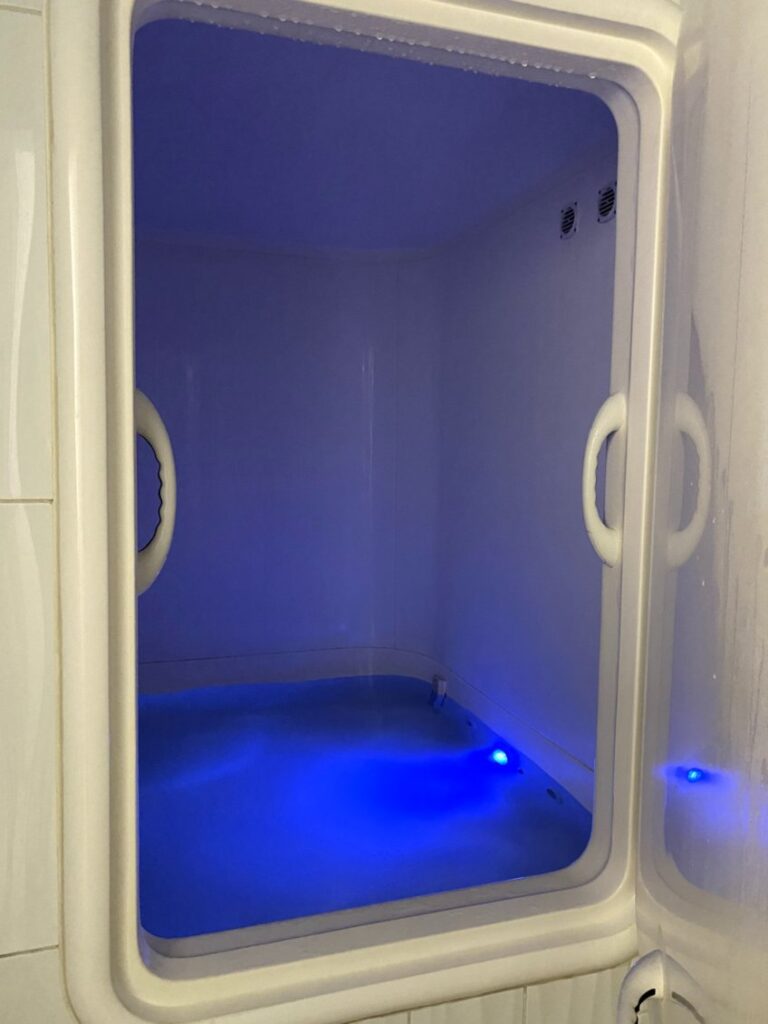Flotation therapy could be the key to more restful nights, reduced anxiety, deep relaxation, and more!
By Miranda, Contributing Writer
It’s almost like waking up in a weird dream – you undress, shower, and enter a dimly lit tank filled with a foot of super salty, warm water. As your body rises effortlessly, your eyes close and your surroundings melt away. Neither hot nor cold, you have almost zero distractions and lose track of time. You are simply floating.
This is how I felt when I tried “flotation therapy” for the first time, also known as REST or Reduced Environmental Stimulation Therapy. It is such a unique experience and unlike anything else. With the growing popularity in the United States and in Europe, let’s see what all the hype is about.

Why is the water saturated with Epsom salts?
If you look into things, the health benefits of soaking in Epsom salts seem to be inconclusive. Many sources will mention that magnesium sulfate (Epsom salts) cannot be absorbed through the skin and that any benefit is just a placebo. However, other sources will cite Epsom salts improve sore joints and muscles, sleep, and the body’s ability to detox. From personal experiences after floating, I noticed my skin was much softer and my sleep that evening was incredible.
Whether you are a believer or a skeptic, the Epsom salts do provide one undeniable benefit when you are in the float tank: they allow you to instantly float. According to True REST Float Spa a leading chain with locations across the USA, they say: “1000 pounds of salt in 180 gallons of water creates a 30% salt solution, enabling you to float effortlessly atop the water.” This means your body and mind can relax without actively thinking about staying afloat.
What is the purpose of floating?
The concept originated from the curiosity of two doctors in the 1950s at the National Institute of Mental Health. They wanted to see what would happen to the brain if it didn’t have distractions from outside stimuli. They tested several ways to achieve this state of “sensory isolation” or “sensory deprivation”. For example, different types of masks and helmets, along with standing in a tank of water somewhat like a scuba diver. Ultimately in the 1970s, the current version of flotation therapy was discovered.
The floating aspect is supposed to be critical in this entire experience. It produces weightlessness, which is said to help with chronic pain, deep relaxation, and stress reduction. Our bodies are constantly sensing things like noises and smells. The almost ever-present sense is the tactile sense. Our feet are on the ground, our bottom is on the chair, our fingers are grasping a phone, or our head is lying on a pillow… We are always in physical contact with something. When you float, there is a point in time when you cannot tell where the water and air begin or end. Everything just feels like it is blended together, including your body. This enables the body to relax more easily and feel less stress or pain.

Is flotation therapy beneficial?
Numerous studies and research articles point to the mental benefits of flotation therapy. Some have studied improvements in the mental health of Veterans with PTSD. Other research cites a positive impact on anxiety and depression. Meditation coach, Fred Jezzi, gave me a great analogy. He said, “Floating is like forced meditation for your mind…like telling your toddler to go in the corner for a time out.”
We live in a world with constant stimulation. There are subliminal messages from advertising, conscious decisions we need to make, interpreting body language, and more. When you do flotation therapy, you quiet a lot of these distractions. The mind has a better chance of being still. This enables you to experience a unique “altered state of consciousness” that just feels very peaceful. Don’t get me wrong, you can also feel flooded by a lot of random thoughts. But with one hour in the float tank, you hopefully can get past that and experience true calm and serenity.
Is floating safe for everyone?
There are a few contraindications to be aware of. Flotation therapy is not recommended if you have the following:
- Kidney disease as you may have difficulty processing the magnesium
- Epileptic conditions
- Low blood pressure
- Claustrophobia
If you have open wounds, skin ulcers, or any contagious diseases (including gastrointestinal ones), then you should wait a few weeks after you heal to try flotation. Just a heads up, even a small paper cut might sting with all the Epsom salts.
If you are pregnant, flotation is possible and can help with many pregnancy symptoms, but it is best to consult with a doctor beforehand.
Lastly, there is one side effect to note. You may feel a bit nauseous after your first session from the body detoxing. This was not the case for me.
Ultimate conclusion
If you are curious about REST flotation or if you could benefit from help with stress, anxiety, sleep, or chronic pain, then it might be worth a try. The research points to a positive effect on both physical and mental well-being.
At the very minimum, you will likely have an experience unlike NO other.


It’s Wonderful good article. It’s very helpful and knowledgeable article for everyone. I think we should follow this tips. Thansk for this good article.
Thank you for reading!
I can’t wait to try it!! I always hear good things about it. Where did you go? And thanks for sharing your experience.
You’re welcome! True REST float spa has locations in various states and I have used their services. Also, there are often specials on websites like Groupon for local places and first time floaters.
You’re the second person I’ve seen talking about floating lately and how much it helps from a health perspective! I may have to add this to my own wellness routine in the near future as I could always use help destressing. Being a business owner can be tough so we have to be able to combat it somehow. Thanks!
Yes, self care and stress relief is so important. Just a matter of finding what works for you!
This article is really good. I support your work.
Very informative post, really liked this post… Thanks for sharing.
Great Image! thank you, for everything… Keep coming out with new ideas!
I agree with the guy above me. Very good post, Nice Information… Thank you!
Great information and especially useful for PTSD folks (As an Army Veteran) I work with PTSD Veterans and have to believe this type can really help those with the invisible scars of war!